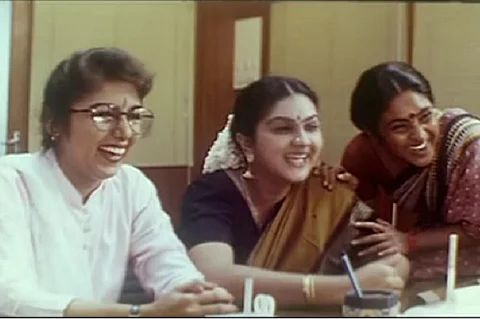

Jyotika's upcoming film Magalir Mattum, with its premise of a women's only road trip, has already set expectations. The film goes by the same title as the 1994 Tamil comedy which was a remake of Hollywood's 9 to 5. However, although the plot was mostly the same, the first Magalir Mattum was a delightful adaption that was rooted strongly in the local culture.
Barring Kamal Haasan who makes a cameo, the film had no male lead. Its stars were Revathy, Urvashi, and Rohini, three extremely versatile female actors who have taken on substantial roles, though never in the same league as their male counterparts. Directed by Singeetham Srinivasa Rao, Magalir Mattum was a laugh riot. However, at the heart of the film was a serious issue that's being discussed more and more these days - sexual harassment at the workplace.
Tamil films have had their share of rapey and lecherous bosses but beyond a voyeuristic scene or two which showed the man exploiting his female employee (usually the hero's sister or some other woman whose "honour" he must defend), the narrative seldom dealt with the subject meaningfully. The woman's harassment is merely used as a trigger to bring out the hero's machismo. Further, the victims in these films barely had any agency and did little more than sob at their "kettu pona" ("spoilt") statuses.
Magalir Mattum not only explored the dynamics of workplace harassment and the power equations involved, but it also gave us three female leads who were willing to object to it in their own way.
Paapamma (Rohini), the cleaner, avoids the sleazy boss Pandian (a superb Nasser) as much as possible but she has a sharp tongue and is a no-nonsense character. Urvashi (Janaki), is a typist and someone who scares easy - yet, she resists by showing her resentment whenever she gets a chance. The leader of the pack is Sathya (Revathy) who is unafraid of giving it back to Pandian openly, unlike her more hesitant colleagues.
And emboldened by Sathya's attitude, the women unite across caste and class barriers to fight a common enemy. Whenever a case of workplace harassment makes the headlines, there's always someone who asks what made the victim continue with the same job across such a long period of time in the face of harassment.
Magalir Mattum answers the question - these are women who not only need the job and the money, but they also confront patriarchy every which way they turn. Janaki is the sole breadwinner of the family after her husband loses his job, a fact society won't allow them to be comfortable with; Paapamma is married to a drunkard who has questioned her morality; Sathya joins work after her wedding was stopped due to the groom's demand for dowry. Pandian, then, is only one of the many routine problems that these women face.
While bromance is a recurring theme, Indian cinema has rarely explored female friendships. Magalir Mattum is rich in these moments - whether it's when they are sharing their food, name-calling Pandian (Mookan!) or having each other's back to prevent him from catching any one of them alone, the film realistically captures the friendship that these women enjoy.
When Paapamma, Janaki, and Sathya end up with an unconscious Pandian in their hands, with Janaki believing that she had poisoned him by accident, they come together to ride the storm. In the process, they break out of their fears and find their strength lies in putting up a united resistance.
The film also recognises that women too can be patriarchal although it fell back on using a stereotypical dark skinned and supposedly unattractive woman (Pandian acts disgusted by her interest in him though he lusts after everyone else in office) to drive home the point.
Magalir Mattum achieved its cult status not only because it was a film that every woman could relate to, it was also because it had such an engaging story to tell. The film's characters were funny and lovable, breaking away from the narrative of victimhood and reclaiming their voice. For the 90s, which either had "strong" women characters who were nevertheless patriarchal in conception or ones who were mere decorations on screen, Magalir Mattum was a refreshingly unique film.
The title Magalir Mattum comes from the moment when the women at a bus-stop grumble about the drivers who never stop the bus for them. "This will change only when we get a female bus driver," they say, a completely magalir mattum (ladies only) bus. They could have been talking about the south Indian film industries today where stars like Manju Warrier, Nayanthara, Jyotika, Anushka Shetty, Trisha, Parvathy and others are getting into the driver's seat and pushing the envelope further for women-centric cinema.